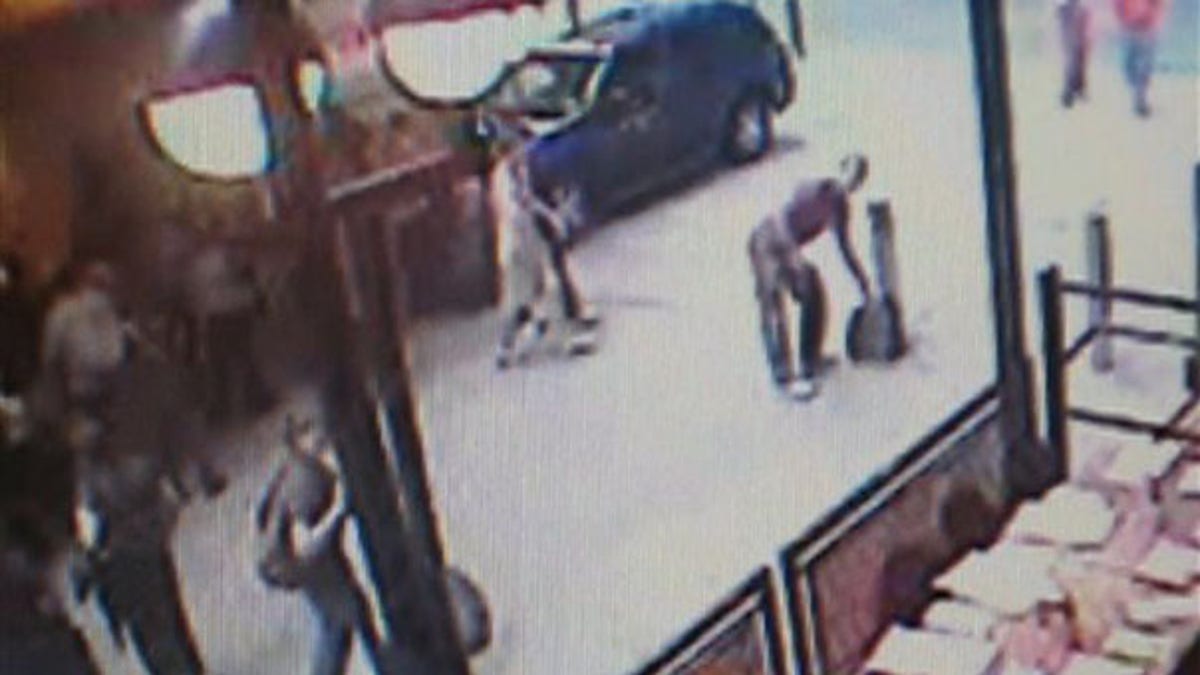
A frame made from a surveillance video released by the New York Police Department May 3 shows a man pick up a bag after removing a shirt in an alleyway in New York. (AP Photo)
New York officials say the federal government isn't providing them with enough of what they need most to head off another terror attack in the nation's largest city: cold, hard cash.
The New York Police Department finds itself in the awkward position of having to use Saturday night's near-catastrophe -- a potentially devastating car bomb discovered in the heart of Times Square -- to appeal to the federal government for more funds.
State and local lawmakers, as well as NYPD officials, are pointing out what seems obvious -- that New York City is and continues to be a top terror target. They're trumpeting the role of police officers in defusing a bomb and investigating the scene after an SUV carrying the device was discovered Saturday night.
But New York officials appear weary of continually wrangling with the federal government -- dating back to the Bush administration -- for money to support new technology and programs aimed at stopping an attack in America's largest city and the financial capital of the world.
Asked Sunday afternoon what was stopping the NYPD from developing a critical surveillance and detection program, Police Commissioner Raymond Kelly answered with a single word: "Money."
The NYPD has more officers -- about 35,000 -- than the FBI has employees. Its Counterterrorism Bureau, formed in 2002 following the Sept. 11, 2001, terror attacks, was the first of its kind in the nation and encompasses several programs aimed at protecting against different kinds of attacks. One unit sets up vehicle checkpoints along key roads and bridges; another works on harbor security; another researches ways to detect weapons of mass destruction; another analyzes intelligence.
In the wake of Saturday's Times Square incident, officials are drawing heightened attention to the importance of NYPD counterterror programs called the Lower Manhattan Security Initiative and the Securing the Cities Initiative. The latter is a partnership between local officials and the Department of Homeland Security to set up detection systems for nuclear and radiological weapons.
The Lower Manhattan Security Initiative is a broader city plan that starts with a massive surveillance system -- complete with security cameras, license plate readers and on-the-ground officers. Surveillance cameras, while controversial, are providing investigators with valuable images of activity around Times Square before the car bomb was discovered -- though those cameras are not yet part of the sophisticated monitoring network that city officials are trying to establish.
Sen. Chuck Schumer, D-N.Y., plans to call on the Obama administration and Congress to fully fund the Securing the Cities program as well as send federal funding to New York City to expand its surveillance program into mid-town Manhattan.
Rep. Peter King, R-N.Y., and Sen. Kirsten Gillibrand, D-N.Y., have already written a letter to congressional colleagues urging them to restore $20 million in next year's budget for the Securing the Cities program.
"The Obama administration has eliminated all funding for that," King told Fox News on Monday. "I'm fighting as hard as I can ... but we need to keep the fight up."
King said the program is needed to protect the perimeter of Manhattan and monitor for threats coming from the surrounding boroughs.
Kelly said Sunday that the department wants to expand the lower Manhattan security program into midtown -- where the Times Square bomb was found -- but that it is only in the planning stage.
"It takes money -- federal money is what we're looking for in this regard," he said.
He explained that the vision for the program is to have not only surveillance cameras, but "analytic software" that would set off alarms when certain suspicious activities are detected.
For instance, an alarm could go off if a bag was left unattended, or if a vehicle drove along the same block multiple times.
"This is a whole new area for us. It has a lot of promise in that regard, we're very enthusiastic about it," Kelly said.
But in an interview Sunday on CNN, Schumer said, "We need Washington to back New York up."
He touted New York's surveillance plan and echoed King's call to fight for the money.
"This incident is a reminder, we need all the help we can get," Schumer said.
King and Gillibrand wrote in their letter that more funding is needed not just to protect New Yorkers, but everyone who relies on the region's economy.
"(Securing the Cities) provides an operational capacity to interdict a radiological or nuclear weapon in one city, which can prevent that weapon from being delivered and detonated elsewhere in the nation. It can also prevent the widespread economic damages that would be associated with a detonation in the New York tri-state region," they wrote. "Without this additional funding, neither completion of detection work and sensor networking nor replication in other high risk areas will be possible."




